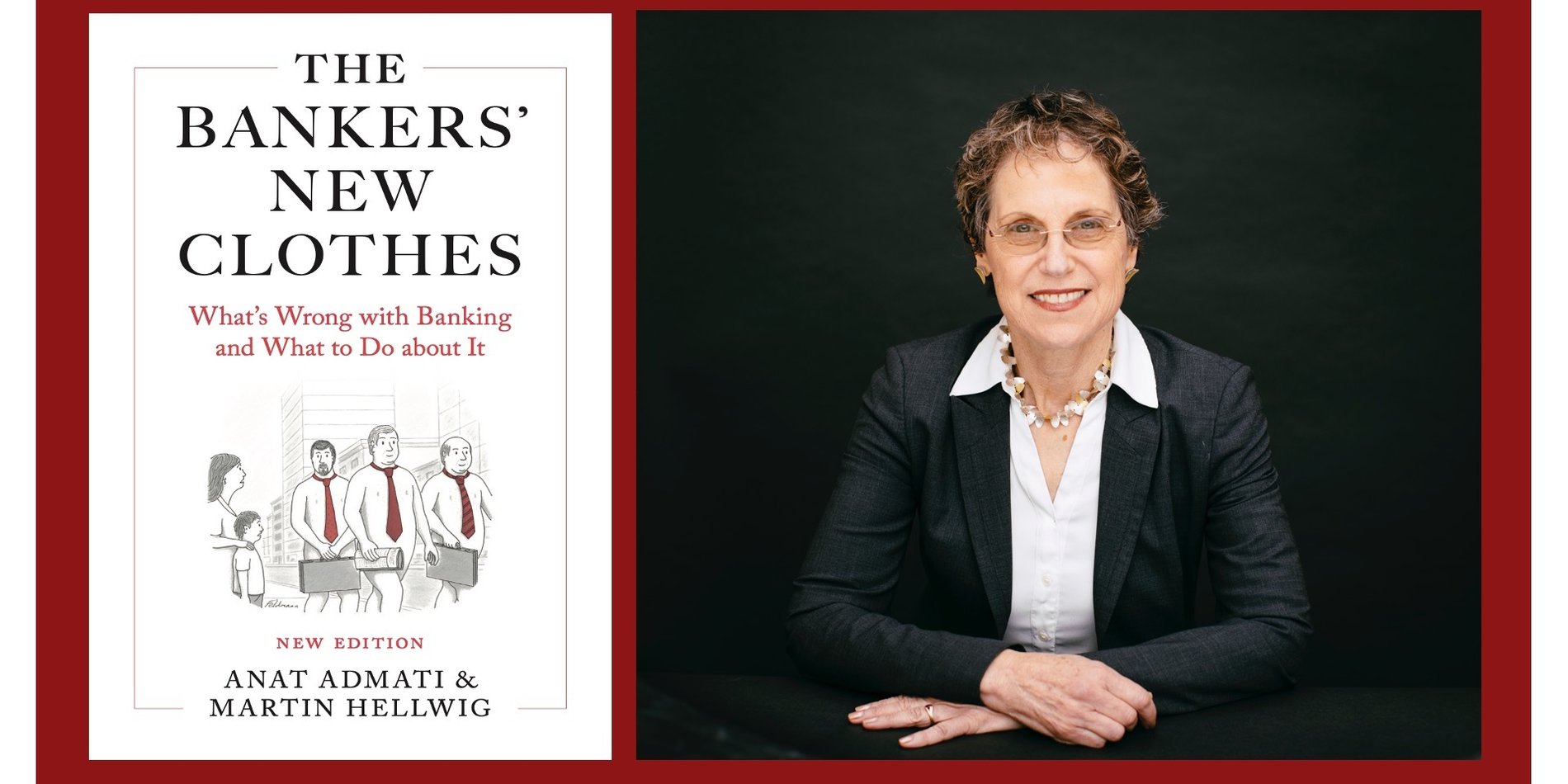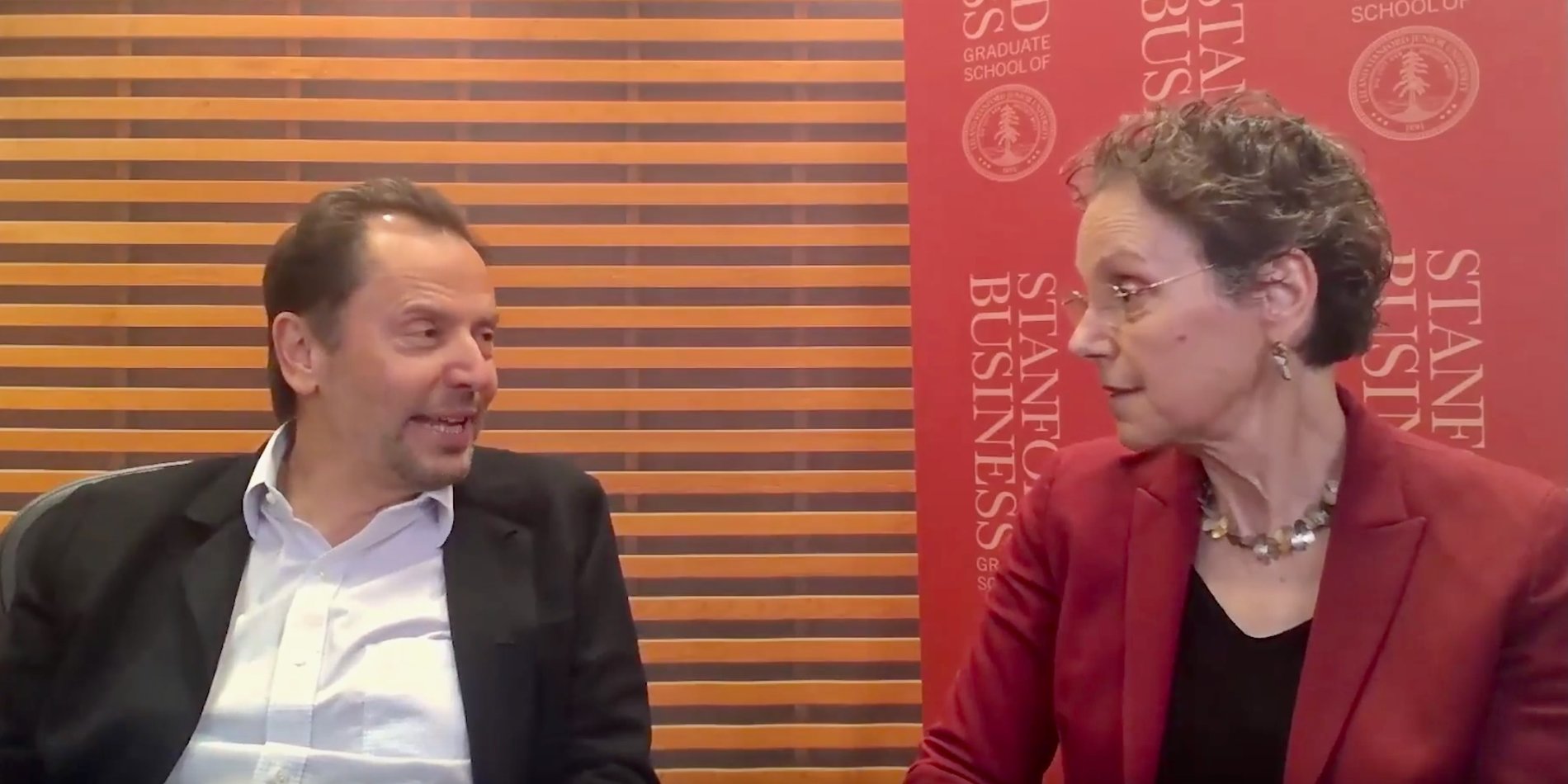Tariq Fancy on Why We Need to Pull the Moral Cloak of Responsibility Away from Business
Watch the Event:
Tariq Fancy’s “Secret Diary of a Sustainable Investor” essay series rocked the investment world when it was first published in 2021. Fancy had been hired by BlackRock, the world’s largest asset manager, as its first chief investment officer for sustainable investing, but less than two years later, he stepped down over the company’s ESG practices. Fancy went on to become one of the industry’s most vocal critics, an ex-insider who wrote that ESG funds are a “dangerous placebo” that prevents real change on environmental and social issues.
On February 7, Fancy was the guest speaker at an event hosted by the Corporations and Society Initiative (CASI) at Stanford Graduate School of Business. CASI student leader Cooper Wetherbee (MNBA '23) opened the program, held in CEMEX Auditorium, with a quick introduction to CASI’s mission.
“Oftentimes, business schools promote a sort of self-serving mythology that everything can be a win-win, that what is profitable is also by definition good for society,” he stated. “One of the reasons CASI exists is to challenge that notion, to start conversations on campus about the very real and consequential trade-offs that exist both in business and in government, between doing what is profitable, what is easy, what is popular, and what is right.”
CASI faculty co-director Anat Admati spoke next and began her remarks with a review of the event’s title, ESG + CSR = BS?
“I assume you know what BS means,” she quipped, “but what CSR and ESG are, especially CSR, you may not know.”
As Admati explained, corporate social responsibility, or CSR, became a buzzword in business during the 1960s and ’70s, and was purported to be a way to align corporate goals and achieve a positive impact on society. But when economist Milton Friedman’s now famous 1970 essay was published, it sparked a heated and ongoing debate over the role of corporations. Friedman argued that the social responsibility of corporations is to “make as much money as possible.” According to Admati, he “ridiculed these pontificating CEOs that spoke of corporate social responsibility, who, he said, will bring back the iron fist of government bureaucrats” and end up destroying capitalism’s free markets.
The debate has recently intensified with issues such as climate change, social inequality, diversity, and political polarization taking center stage. Now, the latest buzzwords are “stakeholder capitalism” and “ESG,” which stands for environmental, social, and governance.
In 2019, 181 prominent CEOs from the Business Roundtable released a statement that redefined the primary purpose of a corporation. Companies should “no longer just care about shareholders, which is what they said in the seventies,” Admati told the audience. “They now care about the customers, and the employees, and the suppliers, and the community.”
This new direction supercharged the ESG movement, but it has also become increasingly politicized, with a growing backlash against companies like BlackRock for what is seen as “woke capitalism.”
“So, the questions are, what should be the rules for corporations in society?” Admati asked. “What should be the balance of power between corporations and governments?”
“What we have today is a conversation that will help us move this discussion forward, which is what we, at CASI, want to do.”
With that, she turned the stage over to Bethany McLean, an investigative journalist and author who served as moderator for the discussion. McLean began by asking Fancy for his help in defining ESG. She offered a list of the latest buzzwords.
“Sustainable investing, impact investing, responsible investing, ethical investing. What do these terms mean and do any of them actually mean anything at all?” she asked.
Generally speaking, the best way to think about ESG, Fancy said, is how the financial services industry defines it. “It means taking the art of investing in finance and overlaying a set of additional considerations — environmental, social, and governance — over that investing style.”
Fancy pointed out that ESG allows an asset manager to create an entirely new investment category of products that can provide a market return with an additional “green” benefit.
“That new category is very popular for the industry because it means new assets and growth, and [these instruments] almost always have premium prices attached.”
McLean noted a recent report by Bloomberg Intelligence that predicts by 2025 more than a third of all globally managed assets could explicitly carry ESG labels, totaling more than $50 trillion.
“Why has ESG investing become such a hot fad on Wall Street?” she asked.
Fancy called the reported numbers completely “ludicrous” because ESG investments are extremely hard to define and measure. There is no real rigor around ESG labels, he said, and much of it is “box ticking.”
“There’s an important reason why it’s box ticking,” he remarked. “It’s because they [asset managers] legally can’t say that we’re going to look at ESG and do the better thing, because it would be a violation of fiduciary duty.”
Fancy went on to say that much of ESG investing ends up as “non-binding marketing pledges,” which may sound harmless, but Fancy sees otherwise. When people believe that green investing can’t be any worse than what corporations and asset managers are already doing, it becomes what Fancy calls “a convenient fantasy to address an inconvenient truth.”
“It allows us to believe that we can keep everything the same and not incur any sacrifice,” he said.
Instead of experts addressing these critical issues, businesses can tout their ESG practices, while ESG ratings agencies offer services with no official industry standards. The danger, according to Fancy, is that the system looks like it has corrected itself without needing to change the rules in any way.
McLean asked Fancy if he thought BlackRock and other big corporations were leaning into ESG investing as a smart and potentially lucrative business strategy because they believed that it could change the world, or “because they saw it as a way to keep the status quo while enabling us all to believe that we were doing our part to change things.”
Fancy responded by saying he thinks most people in the financial industry are siloed and don’t see the full picture. He also said corporate tax and investment incentives are a huge part of the problem.
“If you don’t change incentives, then you’re not going to change the behavior of the system, right? And the incentives are misaligned,” he said. “One of the problems about ESG is, for all of its bluster, it doesn’t actually do the one thing that changes the industry, which is change incentives. In fact, it distracts us from the fact that we’re not.”
Fancy went on to say that many of the studies that show ESG investing leads to better returns are “dubious” and done by people who are “self-interested to believe that.”
“On some level, I think, in academia, there is a very innocent desire to be seen to be providing encouraging signals to business, that if you do this little ESG thing we'll do better and the world’s a better place.
“If you say ESG’s good for returns, and purpose and profit overlap,” he said, “you get a lot of consulting work coming in. If you go and say you need regulation, who’s paying you to say that?”
Having been inside the system, he said, the question that remains unresolved is “are we going to rely on voluntary compliance or mandatory compliance?”
Fancy made it a point to state that he is a capitalist; but, he said, “it’s important to distinguish between two types of capitalism, Tesla capitalism and tobacco capitalism.”
“Tesla capitalism is, we need more EVs, and we need them fast, and if you can shake up the industry and create stuff people need and move in that direction, that’s great. By the way, government has a role to play there, right? Government can actually go in and push more of that.”
Fancy explained that tobacco capitalism exposes the misapplication of shareholder value at all costs, including fierce opposition to government regulation. He recounted efforts by big tobacco companies to slow the regulatory process and protect their profits through intense lobbying and marketing while continuing to harm consumers.
“No one wants to go out and say that in business, even though that’s what fiduciary duty generally means.”
McLean dug deeper into Fancy’s comments.
“Is what you’re saying, essentially, that capitalism can be either about changing the status quo [or] that some of the incentives, even the legal requirements for our corporations to maximize profits, are essentially protecting the status quo?”
“There’s no question in my mind that capitalism is the best system, if used correctly, to pull out the innovations we need,” Fancy replied. “I think we can get solutions if we direct capitalism effectively, but we also need to be honest about the ones that are not in our interests, where it’s the tobacco capitalism.”
Fancy concluded, “My biggest concern is that the leaders of the system today don’t seem to actually understand the difference or feel that there’s some obligation to show real leadership in the 2020s and say that there’s a difference.”
For McLean’s next question, she turned to Anand Giridharadas, author of the book Winners Take All The Elite Charade of Changing the World. She asked Fancy if he shared a similar view to Giridharadas’ argument that the charitable giving by many of the world’s business leaders is a way to keep the status quo, by preventing change rather than encouraging it.
“Is ESG investing also about keeping the status quo?
As an ex-insider, Fancy said he doesn’t believe that business leaders are “in the middle of the system trying to screw us.”
“At the end of the day, power will have a greater voice in conversation, whether it’s Davos or here or there. It’ll bend toward where people have interests.”
McLean mentioned another prominent ESG critic at the other end of the spectrum, Vivek Ramaswamy. His book, Woke, Inc.: Inside Corporate America’s Social Justice Scam, she said, argues that corporations have “no place in advancing any kind of environmental, social, or governance goal.”
“Where do you two meet and where do you differ?”
Fancy said that while Ramaswamy makes some interesting arguments, he is backed by Peter Thiel and other libertarians who don’t seem to want regulation, which is a clear difference from Fancy’s position. Where they do meet, he said, is the idea that many business leaders pretend to show leadership when, in fact, they appear almost cowardly at times.
“He [Ramaswamy] talks about how business leaders here will be ready to throw themselves behind the latest fashionable cause, and it doesn’t seem to be really based on conviction more than just sort of a convenient PR strategy, and yet in China, they won’t say a thing. And he’s absolutely right.
“It’s weakened American leadership and it’s an example, for me, of where American capitalism is getting in the way of American democracy at exactly the worst time in history for that to happen.”
At some point, Fancy said, we have to “pull the moral cloak of responsibility away” from business leaders.
“And I think one thing where Vivek is right, probably, is you don’t get the moral cloak of respectability if all you’re doing is running a PR strategy that’s going to switch whenever it’s convenient.”
Before turning the program over to audience questions, McLean challenged Fancy with a question about free markets:
“One fundamental objection to what you’re saying might be, we don’t want rules for our free market. Why should we be restrained by any rules, and won’t that inhibit the functioning of the free market? What would you say in response to that?”
Fancy was quick to respond that “the greatest hoax is the free market hoax.”
“Ask any lawyer. A market is just a collection of rules. You can change those rules and you’ll get different outcomes, all of which can be considered market outcomes.
“It doesn’t make any sense to say that the government is intervening in the free market any more than the NBA is intervening in the game of basketball by drawing a line behind which you get three points for a shot. They can move that line back if they want less three-pointers; those are all deliberate rules that create outcomes of the system.”
Fancy concluded by saying, “This reflexive anti-regulation push has to be replaced by a more intelligent understanding of the fact that systemic solutions are going to require the power of government.”
During the audience Q&A session of the program, Fancy was asked if most of ESG investing is, in fact, greenwashing.
“One of the biggest challenges for the industry is it never actually clarified whether this is good for investors or good for the planet,” he said, “and those are completely different things. ”
“It doesn’t create any value for the world in terms of allocating capital correctly. But it’s definitely a big win for asset managers.”
Fancy also brought up the issue of climate risk. When bankers and financial experts say they are protecting against climate risks, he argued, they mean climate risks in their portfolios, not preventing climate change from happening.
He recounted the story of a friend who was buying property in Miami at the time when Fancy was working at BlackRock. His friend believed BlackRock’s focus on climate risk would somehow protect his investment.
“He didn’t get it until I finally said, listen, we’re not trying to stop Miami from getting wrecked by climate change. We’re trying to get our money out before it hits!”
One questioner asked Fancy what could be done given the short timeline to act on climate change and the government’s notoriously slow-moving efforts to regulate business. Are there intermediate steps that could be taken? What would it take to get companies like BlackRock to do the right thing?
Fancy told the audience that younger employees in a corporation have more power than they think and should use their voice to demand change from within.
The ESG Data Convergence Initiative was also discussed as a potential solution to the current lack of standardized metrics. While Fancy felt it was a step in the right direction, he stressed the difference between measuring something and managing it.
Fancy offered another sports analogy to emphasize his point. “If you have disclosure without a referee to give out a red card, would you see the tackle in slow motion? You still need a penalty, so they have to be done in concert.”
McLean wrapped up the event with a final, thought-provoking question for Fancy, one that challenged the notion of “stakeholder capitalism” as the new model.
“Should we be aiming for a world in which Milton Friedman is actually right, and corporations can just focus on making money because government can focus on setting the rules under which corporations should make money?
“What would it take to get to a world in which Milton Friedman can be right?”
Fancy said he felt that to get there, it will take government action along with a wholesale change in culture.
“It took us 50-plus years to get here, right? We’ve built complex [corporate] bureaucracies that are squeezing profits out of every last step.
“You’re going to need to do both the regulatory push which moves us toward Milton Friedman, that you just focus on profits and let the referees marshal things. But you also do need to change the culture in the game. They both need to happen. But mandatory compliance is the key because you’ll never get there as fast as we need without that.”
























